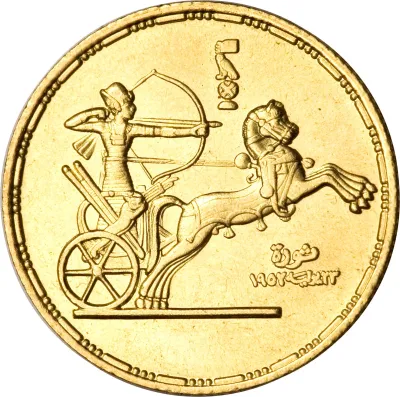
1 Pound (100 Piastres), Egypt, 1955 - Rare coin in our collection
Just added another Rare coin to our collection.
It's Egyptian - Revolution Anniversary, 1955 Gold Pound (100 Piastres).
| Year: | 1955 |
| Diameter: | 23 mm |
| Inscriptions: | Egypt, Pound (100 Piastres), 1955 |
| Obverse: | Horse, chariot and archer |
| Reverse: | Denomination and dates |
| Material: | Gold |
| Weight: | 8.5 grams, 0.875 gold |
| Krause Number: | KM# 387 |
The coin is graded by NGC MS66 ,Extremely high grade of this scarce type.
Difficult to find today, however as all interesting numsmatic stuff.
According to last sales, the price is about $600-$900
The Egyptian Revolution of 1952 (Arabic: ثورة 23 يوليو 1952), also known as the 23 July Revolution, began on 23 July 1952, with a military coup d'état by the Free Officers Movement, a group of army officers led by Muhammad Naguib and Gamal Abdel Nasser. The revolution was initially aimed at overthrowing King Farouk. However, the movement had more political ambitions, and soon moved to abolish the constitutional monarchy and aristocracy of Egypt and Sudan, establish a republic, end the British occupation of the country, and secure the independence of Sudan (hitherto governed as an Anglo-Egyptian condominium). The revolutionary government adopted a staunchly nationalist, anti-imperialist agenda, which came to be expressed chiefly through Arab nationalism, and international non-alignment.
The revolution was faced with immediate threats from Western imperial powers, particularly the United Kingdom, which had occupied Egypt since 1882, and France, both of whom were wary of rising nationalist sentiment in territories under their control throughout the Arab world, and Africa. The ongoing state of war with Israel also posed a serious challenge, as the Free Officers increased Egypt's already strong support of the Palestinians. These two issues conflated four years after the revolution when Egypt was invaded by Britain, France, and Israel in the Tripartite Aggression of 1956. Despite enormous military losses, the war was seen as a political victory for Egypt, especially as it left the Suez Canal in uncontested Egyptian control for the first time since 1875, erasing what was seen as a mark of national humiliation. This strengthened the appeal of the revolution in other Arab and African countries.
Wholesale agrarian reform, and huge industrialisation programmes were initiated in the first decade and half of the revolution, leading to an unprecedented period of infrastructure building, and urbanisation. By the 1960s, Arab socialism had become a dominant theme, transforming Egypt into a centrally planned economy. Official fear of a Western-sponsored counter-revolution, domestic religious extremism, potential communist infiltration, and the conflict with Israel were all cited as reasons compelling severe and longstanding restrictions on political opposition, and the prohibition of a multi-party system. These restrictions on political activity would remain in place until the presidency of Anwar Sadat from 1970 onwards, during which many of the policies of the revolution were scaled back or reversed.
The early successes of the revolution encouraged numerous other nationalist movements in other Arab, and African countries, such as Algeria, and Kenya, which were engaged in anti-colonial struggles against European empires. It also inspired the toppling of existing pro-Western monarchies and governments in the region and the continent.
The Revolution is commemorated each year on Egypt's national day, Revolution Day, on 23 July.
The leaders of the Revolution, Muhammad Naguib and Gamal Abdel Nasser
Another Egyptian coins at http://www.globecoins.com/Catalog/Egypt/
We are working hard to provide outstanding service to our clients.
Do not hesitate to contact us for any questions. We will be happy to recommend valuable Gold Coins for your Collection or Investment.
| Follow Us on Facefook |
Daily - News, Tips, Interesting articles, Highlight coins, Clients feedback and review and more and more and more.
Your Like will be very appreciated.


